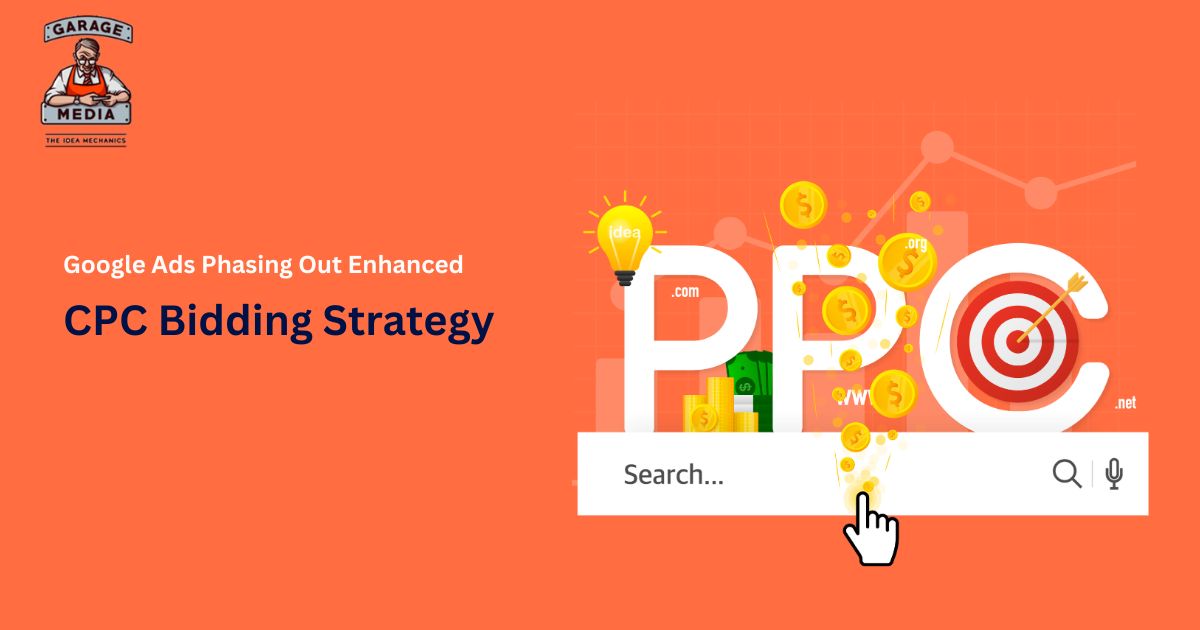
Google Ads Phasing Out Enhanced CPC Bidding Strategy
As announced on September 5, 2024, Google Ads’ decision to phase out the Enhanced CPC (ECPC) bidding strategy marks a pivotal shift in the landscape of digital advertising. This move is not merely a change in strategy but a transition towards more sophisticated and data-driven bidding approaches. This comprehensive guide delves into the implications of this phase-out, supported by relevant data and industry benchmarks to help advertisers adapt effectively.
What is Enhanced CPC Bidding?
Enhanced CPC (ECPC) allows advertisers to manually set bids while automatically adjusting them to optimize for conversions. This semi-automated approach has been valuable for balancing control with optimization. However, Google is now prioritizing fully automated bidding strategies that leverage advanced machine learning to enhance ad performance.
What will Change in Enhanced CPC (ECPC) in October 2024?
Based on the announcement, Google Ads will phase out the Enhanced CPC (ECPC) bidding strategy. The key changes that will take place in October 2024 are:
- No new opt-ins: Advertisers will no longer be able to select the ECPC bid strategy for new or existing campaigns.
- Removal for switched-out campaigns: If a campaign has already been switched out of ECPC, the option to switch back will be removed.
- Continued use for existing campaigns: Campaigns currently using ECPC can continue to do so until March 2025.
Reasons for the Phase-Out
1. Shift Towards Advanced Automation
Google’s shift from ECPC to more advanced automated bidding strategies like Target CPA and Target ROAS reflects its broader focus on leveraging machine learning. Automated bidding strategies offer greater efficiency by analyzing vast amounts of data to predict conversion probabilities and adjust bids in real-time.
2. Enhanced Performance Optimization
Fully automated bidding strategies are designed to deliver superior performance. They utilize sophisticated algorithms to optimize bids based on your goals, whether that’s maximizing conversions, revenue, or other key metrics.

Impact on Advertisers
1. Adjustment to Fully Automated Bidding
The phase-out of ECPC necessitates a transition to fully automated bidding strategies. Advertisers need to assess their current bidding strategy and implement alternatives such as Target CPA or Target ROAS, which can provide enhanced optimization and performance.
2. Campaign Management Changes
Campaign management will require recalibration as advertisers shift from ECPC. Key aspects include adjusting target CPAs, ROAS, and budget allocations to align with the new bidding strategies.
3. Cost Implications
The transition to automated bidding may result in initial cost increases as the system learns and optimizes bids. However, over time, these strategies are designed to improve cost-efficiency and overall performance.
Transitioning from Enhanced CPC
1. Evaluate Your Advertising Goals
Begin by assessing your advertising goals to choose the most suitable bidding strategy. For instance, if your focus is on cost-efficient conversions, Target CPA may be ideal. Conversely, if revenue optimization is the goal, Target ROAS could be more appropriate.
2. Implement and Monitor New Bidding Strategies
Set up your new bidding strategy in Google Ads and ensure accurate conversion tracking. Continuous monitoring is crucial during the transition to make necessary adjustments and ensure the new strategy performs optimally.
3. Optimize Campaign Performance
Regularly review key metrics such as conversion rate, cost per conversion, and ROAS to gauge the effectiveness of the new strategy. Optimize based on data-driven insights to maximize campaign performance.

Data and Benchmarks to Consider
1. Seasonality and Industry Trends
Seasonal events and industry trends can significantly impact ad performance. For instance, during major holidays or industry-specific events, ad costs and effectiveness may fluctuate. Historical trends suggest that CPCs have generally increased over time, particularly for competitive keywords, while CTRs have remained stable with minor fluctuations
2. Global Trends in Google Ads
- Increasing Competition: The rise in the number of advertisers has led to increased competition and higher CPCs, especially in competitive niches.
- Shift Towards Automation: Automated bidding strategies are becoming the norm, providing advanced optimization capabilities.
- Focus on Measurement and Attribution: There is a growing emphasis on using advanced tracking and attribution models to measure campaign effectiveness.
- Rise of Mobile Advertising: With the surge in smartphone use, mobile advertising has become a critical component of many campaigns.
3. Industry Benchmarks
- E-commerce: Conversion rates typically range from 1-3%, with higher rates for well-established brands and optimized websites.
- Lead Generation: Common benchmarks indicate conversion rates around 2-5%, varying by industry and lead quality.
- App Installs: Typical install rates are around 1-2%, influenced by factors such as app category and targeting.
Google Ads in India: Key Trends
- Rapid Growth: The Indian digital advertising market is expanding rapidly due to increased internet penetration and smartphone adoption.
- Increased Adoption: More businesses in India are recognizing the value of Google Ads for marketing.
- Competitive Landscape: Competition for ad space in India can be intense, particularly in popular niches.
- Language-Specific Targeting: With India’s diverse linguistic landscape, targeting ads based on language is crucial for reaching the right audience.
The withdrawl of Enhanced CPC marks a significant shift in Google Ads’ bidding landscape. Embracing fully automated bidding strategies and leveraging data-driven insights will be essential for maintaining and enhancing ad performance. By understanding the impact of industry trends, seasonality, and benchmarks, advertisers can navigate this transition effectively and optimize their campaigns for better results.
